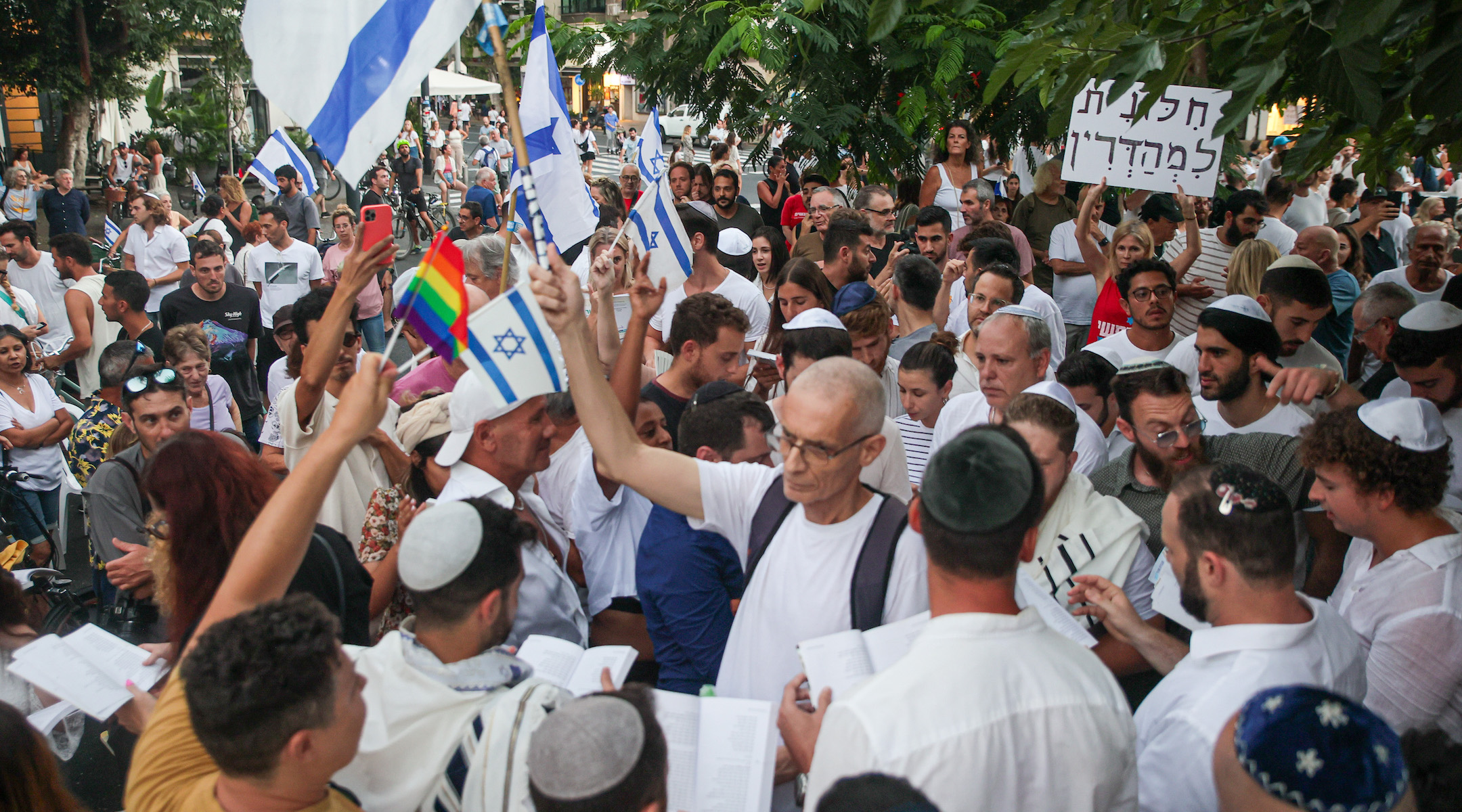(JTA) — Multiple dimensions of Israel’s ongoing civil strife came to a head on the holiest day of the Jewish calendar, as secular activists shut down a public Orthodox Yom Kippur service in the center of Tel Aviv that had been barred by the Supreme Court.
On Yom Kippur and in the hours afterward, Israeli social media accounts filled with videos of Orthodox worshippers and secular protesters shouting epithets at each other — including several instances, from both sides, of the word “Nazi.” A far-right event is planned in the same space on Thursday, promising further fighting, and Israel’s most senior politicians have released dueling statements about the clash.
Israeli President Isaac Herzog lamented that the country appears to be torn apart again half a century after the 1973 Yom Kippur War.
“I know that I speak for the absolute majority of Israeli citizens when I express deep sorrow and shock at the sight of our own people fighting one another on a day that has always been a symbol of unity,” Herzog said at a memorial ceremony for the war.
Israeli Prime Minister Benjamin Netanyahu, by contrast, took a side in the dispute, squarely blaming “extremists on the left” for the disturbance. And his political opponents took the opposite view: Benny Gantz, a centrist leader, called Netanyahu “the biggest hatemonger,” while Tel Aviv Mayor Ron Huldai blamed the incident on “religious and messianic extremists [who] trampled on a court decision.”
The fighting surrounded an Orthodox Kol Nidre service on Sunday evening in Tel Aviv’s Dizengoff Square — a religious event that has taken place annually for several years in the heart of Israel’s largely secular metropolis. This year, Israel’s Supreme Court ruled that the organizers of the service could not erect a divider to separate between men and women — known as a mechitzah — in a public square.
But the organizing group, known as Rosh Yehudi, defied the order and proceeded with the prayer service anyway, setting up a makeshift divider made of Israeli flags. Secular protesters — including many from the mass protest movement that has mounted weekly demonstrations against the right-wing government all year — also showed up to rally against the event. The protesters chanted “Shame,” a cry that has become a mainstay of the antigovernment protests, and the prayer service came to a halt. A similar clash, with a similar result, occurred on Monday.
The incident has become a Rorschach test in Israel, which has grown deeply divided over Netanyahu’s effort to weaken the Supreme Court and has also erupted recently over increasing efforts to impose Orthodox standards of dress and conduct on women in public spaces. The Yom Kippur event was a confluence of the two: a moment when an Orthodox group ignored a Supreme Court decision and established a gender-segregated space in the central square of a largely non-Orthodox city.
For Netanyahu and others on the right, the incident is further evidence that Israel’s Supreme Court functions as a left-wing activist body that is out of touch with Israel’s population, and that the protest movement has resorted to violent tactics in its antipathy toward traditionally observant Jews.
“The Jewish people wanted to unite on Yom Kippur to ask for forgiveness, atonement and unity among us,” Netanyahu posted. “To our astonishment, in the Jewish state of all places, on the holiest day for the Jewish people, left-wing protesters disturbed Jews in their moment of prayer. It seems there are no boundaries, norms or limits to the hate of the left-wing extremists. I, like most Israeli citizens, reject that. There’s no place for such violent conduct among us.”
For Netanyahu’s opponents, by contrast, Sunday’s scuffle was a moment that demonstrated what his government is trying to achieve: a state where court orders carry no force, and where exclusionary religious practices will be imposed on formerly secular public spaces. A flier that was taped to the center of Dizengoff Square admonished visitors to respect the area’s secular culture, in an imitation of fliers in Orthodox neighborhoods warning visitors to adhere to standards of modest dress.
In the past, “no one sought to coerce their form of Judaism on the other,” Yair Lapid, the leader of Israel’s parliamentary opposition, said in a statement. “Until messianic, racist cohorts came here, who are trying to coerce their version of Judaism upon us.”
The fight appears to be far from over. On Tuesday, Itamar Ben-Gvir, Israel’s far-right national security minister, announced that he and other activists from his Jewish Power party will come to Dizengoff Square to hold another Orthodox prayer service. In his statement, he issued an open challenge to the city’s secular protesters.
“I and other members of Jewish Power will come to the same place on this coming Thursday to pray the evening service,” he posted. “Let’s see you try to kick us out.”
Gilad Kariv, an opposition lawmaker and Reform rabbi, appeared to take up the challenge, likening Ben-Gvir to the extremist Rabbi Meir Kahane, a former mentor of the far-right minister.
“Just as we stood against his spiritual father Meir Kahane 35 years ago every time he tried to speak in Tel Aviv, so we will stand against him,” Kariv wrote.
JTA has documented Jewish history in real-time for over a century. Keep our journalism strong by joining us in supporting independent, award-winning reporting.






